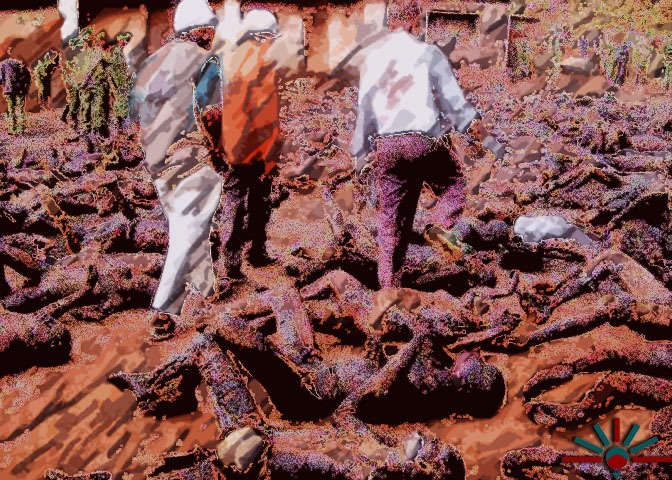Persecuted people mark 4th ‘Rohingya Genocide Remembrance Day,’ recalling atrocities of Aug. 25, 2017
DHAKA, Bangladesh (AA) – Frustration is mounting among stateless Rohingya in Bangladesh’s refugee camps as their longing for a peaceful and dignified repatriation to their home country remains unfulfilled.
Rahima Hatun, 30, along with tens of thousands of others, fled a brutal military crackdown in Myanmar’s Rakhine state on Aug. 25, 2017 and took shelter in a refugee camp in neighboring Bangladesh.
Hatun, together with her three children and husband, has been living in a makeshift tent at the cramped camp in the southern district of Cox’s Bazar, which is also home to more than one million Rohingya.
“My house was burnt down by the Myanmar military and we fled here with the hope that one day we would return to our own land and build a secure and prosperous future for our children. But it seems that our return to our home country has turned into uncertainty,” she told Anadolu Agency.
Stressing their condition in the world’s largest refugee camp, she added: “Despite living here for many years, we are still being treated as stateless people without refugee status. Our children have grown up without an education and proper guidelines. We see only darkness in front of us.”
Another Rohingya mother, Shamsun Nur, 35, said they wished to return home soon.
“We are human beings. We have the right to live in our own country with our children, where we had been living for many generations,” she added.
“We never forget the dangerous memories of ruthless persecution. The Myanmar army had operated against us since Aug. 25, 2017. The Tatmadaw [military] killed us, raped our women, burned down our houses and properties. Our children and aged people were also victimized. Now we are also frustrated here, as there are also threats to activists and human rights defenders in Bangladesh,” said Khin Maung, founder of the Bangladesh-based Rohingya Youth Association.
Maung alleged that they had prepared 200 T-shirts on the occasion of the 4th ‘Rohingya Genocide Remembrance Day’ with their own funds. But Bangladeshi police took them on Saturday.
“It was a human rights abuse,” he said.
Failure to achieve sustainable repatriation
Ambia Parveen, acting chairperson of the European Rohingya Council, echoed the frustration expressed by residents of the camps.
“Since four years, there is zero hope and zero transparency in the returning of Rohingya to their homeland of Myanmar’s Rakhine state,” she said.
She added that Myanmar Army Chief Min Aung Hlaing, who is also the head of the coup regime, once promised to bring back Rohingya refugees from Bangladesh, but there has been no sign of its implementation.
Parveen also slammed the international community for its failure to ensure the legitimate rights of Rohingya Muslims for years, despite their outcry for humanity.
“Why has the international community failed to protect Rohingya Muslims? And why can’t the United Nations and the UN refugee agency, UNHCR, put due pressure on Myanmar’s military regime to start the repatriation process?” she said.
Referring to the brave step by Gambia to file a genocide case against Myanmar at the UN’s top court, the International Court of Justice, Parveen urged Bangladesh to be more vocal against Myanmar.
“Why can’t Bangladesh alone push Myanmar’s military regime to call back refugees according to the MoU [between Bangladesh and Myanmar] which was made in an agreement in 2018? Why did Bangladesh fail to start a dialogue with Rohingya leaders to find a better solution to end the crisis permanently?”
Helping them fight for their rights
Maung Zarni, co-founder of Southeast Asian democrats and rights campaigners FORSEA, pointed to the post-coup public perception in Myanmar as a significant development.
“Rohingya have had a good year in terms of Myanmar public opinion, which now accepts Rohingya as part of Myanmar society…Public apologies have been made by Generation Z and other open-minded anti-racist circles,” he said.
But the future in Myanmar and prospects for the repatriation of Rohingya “are now tied to the question of Myanmar’s prospects for liberation from the current terrorist military regime.”
Referring to the role of Bangladesh as a host country for more than one million Rohingya, Zarni added: “And accordingly, Dhaka could actively empower Rohingya refugees, starting with providing them with opportunities to learn to defend themselves — like military training.”
“All ethnic communities in Myanmar are now arming themselves against the extreme repression by Myanmar’s genocidal military,” he noted.
Since Aug. 25, 2017, nearly 24,000 Rohingya Muslims have been killed, more than 34,000 have been thrown into fires and as many as 18,000 Rohingya women and girls have been raped by Myanmar’s state forces, according to a report by the Ontario International Development Agency (OIDA).

